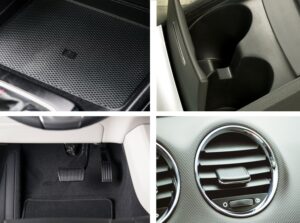Avient extends recycled grade TPU materials for automotive use
Luxembourg, Belgium – Avient Corporation announced the extension of its reSound™ REC Recycled Content Thermoplastic Elastomers (TPEs) portfolio with new AF 7210 grades specifically developed for automotive interior applications such as mats, grips, and console trays. This supports new targets proposed by the European Commission as part of the End-of-Life Vehicles (ELV) Directive.
It is estimated that over 80% of the plastic parts used in automotive applications end up in landfills or incinerators* after reaching end-of-life. To address this issue, part of the ELV Directive stipulates that a minimum of 25% of the plastics used in vehicles sold in 2030 must be sourced from post-consumer recycled (PCR) materials. Of that, 25% must be from circular or closed-loop streams within the automotive industry.
Overall, the new reSound REC AF 7210 TPE grades from Avient contain 51-59% recycled content, with a minimum of 37% from PCR sources, including closed-loop feedstock. They provide comparable performance to 100% virgin equivalents and meet various OEM specifications. They offer an 8-18% reduction in product carbon footprint1 (PCF) compared to virgin TPE grades.
“Using recycled and more sustainable materials has long been a focus in the automotive industry. The introduction of new proposals such as the ELV Directive puts additional pressure on OEMs and automotive tier-one suppliers to deliver on incorporating more recycled content,” said Matt Mitchell, Director, Global Marketing of Specialty Engineered Materials at Avient. “With a minimum of 37% post-consumer recycled content, the new reSound REC AF 7210 TPE grades offer over the minimum 25% recycled content required by the directive, helping customers towards compliance.”
The new reSound REC AF 7210 TPE grades are available in hardnesses ranging from 43 – 90 Shore A and can be used for overmolding onto polypropylene (PP) substrates. They have good UV stability and meet standards for volatile organic compounds (VOCs) and fogging, making them acceptable for use in interior automotive applications.

